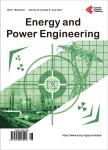Perceptions of Climate Change, Sea Level Rise, and Possible Consequences Relate Mainly to Self-Valuation of Science Knowledge
Perceptions of Climate Change, Sea Level Rise, and Possible Consequences Relate Mainly to Self-Valuation of Science Knowledge作者机构:Division of Life Sciences Rutgers University Piscataway NJ USA Environmental and Occupational Health Sciences Institute Rutgers University Piscataway NJ USA Consortium for Risk Evaluation with Stakeholder Participation Rutgers University Piscataway NJ USA Environmental and Occupational Medicine Rutgers Robert Wood Johnson Medical School Rutgers University Piscataway NJ USA Ecology and Evolution Graduate Program Rutgers University New Brunswick NJ USA
出 版 物:《Energy and Power Engineering》 (能源与动力工程(英文))
年 卷 期:2016年第8卷第5期
页 面:250-262页
学科分类:07[理学] 070601[理学-气象学] 0706[理学-大气科学]
主 题:Perception Decline Climate Change Sea Level Rise Knowledge Level
摘 要:This study examines perceptions of climate change and sea level rise in New Jersey residents in 2012 and 2014. Different surveys have shown declines in interest and concern about climate change and sea level rise. Climate change and increasing temperatures have an anthropogenic cause, which relates to energy use, making it important to examine whether people believe that it is occurring. In late 2012 New Jersey experienced Super storm Sandy, one of the worst hurricanes in its history, followed by public discussion and media coverage of stronger more frequent storms due to climate change. Using structured interviews, we tested the null hypotheses that there were no differences in perceptions of 1260 interviewees as a function of year of the survey, age, gender, years of education, and self-evaluation of science knowledge (on a scale of 1 to 5). In 2012 460 of 639 (72%) rated “global warming occurring as “certain (#4) or “very certain (#5) compared with 453 of 621 (73%) in 2014. For “due to human activities the numbers of “certain or “very certain were 71% in 2012, and 67% in 2014 and for sea level rise the numbers were 64% and 70%. There were some inconsistent between-year differences with higher ratings in 2012 for 3 outcomes and higher ratings in 2014 for 5 outcomes. However, for 25 questions relative to climate change, sea level rise, and the personal and ecological effects of sea level rise, self-evaluation of science knowledge, independent of years of education, was the factor that entered 23 of the models, accounting for the most variability in ratings. People who believed they had a “high knowledge (#4) or “very high knowledge (#5) of science rated all issues as more important than did those people who rated their own scientific knowledge as average or below average.



